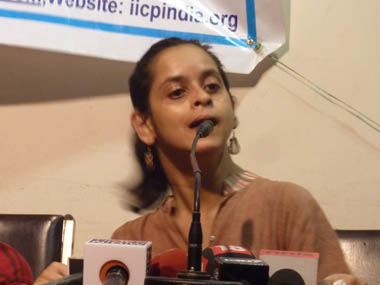“We need to move forward, not backward,” says Jeeja Ghosh. “Backward” for Ghosh would mean reliving that day in February when SpiceJet forced her off the airplane to Goa from Kolkata after issuing her a boarding pass. The pilot was uncomfortable that a woman with cerebral palsy was flying on her own. Ghosh does not just fly on her own. She takes Kolkata’s crowded buses on her own as well. But that day she had to get off the plane, humiliated and distraught. She had been on her way to an international conference in Goa to present a paper on “Inclusion and Empowerment of People with Disability.” Two months later Ghosh says she still feels scared when she has to take another flight. But she and Ankur, the advocacy group she heads, are trying to use the national furore that incident generated as a catalyst for a bigger change. The Human Rights Law Network has filed a lawsuit on her behalf against the Director General of Civil Aviation (DGCA) in the Supreme Court. She has also filed a lawsuit against SpiceJet in consumer court. “We want to carry forward a program that is practical and not emotional,” says Subhra Chatterjee, deputy director at the Indian Institute of Cerebral Palsy. She was speaking at a press conference organised by disability rights advocates in Kolkata on Thursday. [caption id=“attachment_282561” align=“alignleft” width=“380” caption=“Where the law truly fails Jeeja Ghosh is what happens when it’s flouted. Sandip Roy/Firstpost”]  [/caption] The problem is not the law. The Persons with Disabilities Act has been on the books since 1995. DGCA’s own guidelines clearly state an airline cannot refuse to carry a person with disability or reduced mobility. It says staff to be sensitised in assisting them and requires a refresher course every three years. It is clear that the airlines cannot insist on an escort if the person shows independence in feeding, reasonable communication and toileting. So how does a SpiceJet get away with booting a Jeeja Ghosh off the plane? “The law is in a holy book that’s locked in a safe somewhere,” says Shubhra Chatterjee. “On the ground there is a communication gap between the CAA and the airport authority and the airport security and the airline.” But ignorance of the law is no excuse for ignoring the law. Where the law truly fails Jeeja Ghosh is what happens when it’s flouted. “There can be unlimited rules but proper implementation is necessary,” says Ghosh. The DGCA’s own rule book says “The managing body of the airlines and the airport shall ensure speedy and proper redressal of these complaints.” But the missing piece is about how to ensure any of that happens. Ghosh says she does not want to play the victim card. Even though she is suing them in the Supreme Court, she and other disability rights activists are also meeting with the DGCA to demand that it set up a statewide ombudsman who can address complaints, who has the power to investigate and impose penalties. They’ve already had a meeting with the DGCA and passenger airlines. On 5 May, Ghosh and her colleagues have a meeting with Jet Airways in Chennai. But all the rules in the world mean nothing if our attitudes don’t change. Sayandev Mukherjee remembered how Indian Airlines officials refused to even engage with him, directing all their concerns to his parents, just because he was in a wheelchair. “The wheelchair is an extended part of my body,” he says. “I can drive it on my own. I don’t want someone else pushing my wheelchair.” The airlines had sent his wheelchair to the luggage conveyer belt despite him telling them to have it available when the plane landed. All his arguments were to no avail. The next flight was getting delayed. He had to go on an airline wheelchair which hurt his back. “My self respect was hurt,” he adds. “I will keep that boarding pass with me forever.” [caption id=“attachment_282565” align=“alignright” width=“380” caption=“Sayandev Mukherjee (left) remembered how Indian Airlines officials refused to even engage with him, directing all their concerns to his parents, just because he was in a wheelchair. Sandip Roy/Firstpost”]  [/caption] “Helpers, who are invariably male, treat me like luggage. They think it is acceptable to just carry me,” says Madhuri Kapur. She uses a head pointer to spell words to talk to people but what most people do not realise when they see her sitting in her wheelchair is that she is a B. Com graduate and a trained computer professional. Kapur was one of the first students at the Indian Institute of Cerebral Palsy when it opened its doors in 1974. “Change will not happen overnight,” says Mukherjee. “In this sector it takes even longer,” adds Ghosh. Kapur cannot restrain herself. “I am tired of waiting,” she types. “Change is taking too much time.” Though Jeeja Ghosh is optimistic about her meetings with the DGCA and says the Union Minister for Social Justice and Empowerment has taken a supportive stance, SpiceJet is unfazed. They did not come to the all airlines meeting with the DGCA. They claimed their pilot did nothing wrong because he said Ghosh had flecks of blood coming out of her mouth, a claim Ghosh angrily denies. “SpiceJet sent some flowers to her,” says Sudha Kaul, the founder of the Indian Institute of Cerebral Palsy. “And that’s all they have done for Jeeja Ghosh.” Until there is a real ombudsman with teeth, a JanLokpal for the aviation passenger if you will, the Jeejas and Sayandevs will continue fly at their own risk.
SpiceJet claims it did nothing wrong in forcing Jeeja Ghosh off the aircraft. But Ghosh wants to use the national attention that incident got her to push for a bigger fight — all the way to the top of the civil aviation authority.
Advertisement
End of Article


)
)
)
)
)
)
)
)
)



